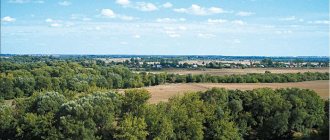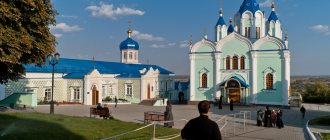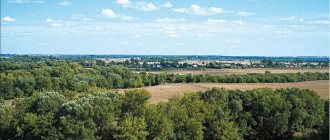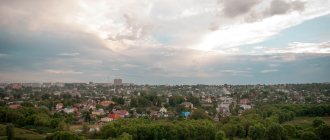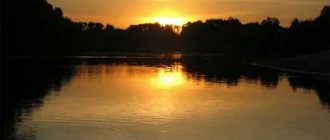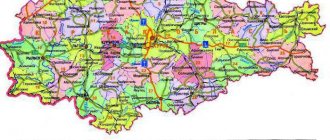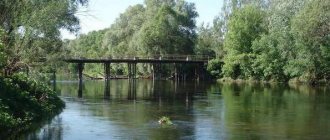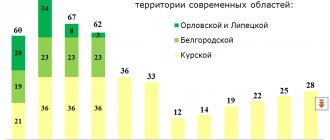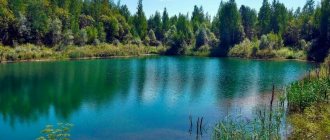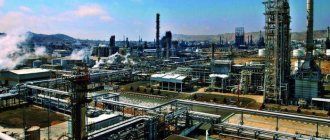Beloretsk against the backdrop of Raspberry Mountain
Sergey Sinenko
History of the city of Beloretsk (Bashkiria)
Beloretsky district is the largest in the republic. There is no end to it. Huge mountains, forests, stone pillars, mountain rivers, deposits of iron ore of rare purity and a small amount of impurities, deposits of gold, ocher, marl, shale, chromite... How to arrange all this? There is work here for two hundred, no, five hundred years! The entire history of Belorechye is determined by the nature of the vast space that people inherited.
Everything in Beloretsk suggests that it is a large metallurgical center. When entering from Ufa you see a giant elk on the right, on the left there is a monument to the metallurgist and a stele with the inscription “Beloretsk is a city of metallurgists. 1762". And in the city itself, reminders of this are found at every step.
But the city became different. He has changed. And the people became different. There are no more proud metallurgists. Because ore mining has stopped and steel smelting has almost stopped. Because the words and concepts that previously defined the life of the city have become anachronistic: “blast furnaces”, “open hearths”...
Now I have bought the plant. And a new word appeared in the speech of Beloretsk residents - “offshores”. It can be heard in the local administration, and in the newspaper “Beloretsky Rabochiy”, and from random passers-by on the street.
At first I was surprised how this could be, since the company’s products have defense or semi-defense significance. “Not anymore,” they reassured me. “The plant has not been working for the defense industry for a long time.”
Old water tower in Beloretsk outside and inside. Photo by Sergei Sinenko
Village named after Marshal Zhukov and the city of Kursk
The village named after Marshal Zhukov, built specifically for disbanded military units withdrawn from Germany in 1994, is located in the Kursk region, in the Black Earth Region. Turkish contractors built about a hundred houses on a vacant lot, after cutting down many trees, in six months. The decision to move from this place to the city of Beloretsk in the Republic of Bashkortostan was not made in one day.
Eight kilometers from Zhukov is the city of Kursk. This is the regional capital with very beautiful nightingale groves. There are many beautiful places worth seeing here. In the city center, opposite each other, stand the Maly Drama Theater and the Regional Library, where publications dating back to the eleventh century are stored.
The city of Kursk is divided into three districts: Central, Zheleznodorozhny and Seimsky. Three rivers flow nearby: the Seim and its tributary, as well as the Tuskar River. The Seim River flows near the village of Marshala Zhukov, and there are also coniferous and deciduous forests with birch groves. Previously, until 1994, trees grew on the site of the urban-type building, and there was a village nearby.
Panel houses stand like twins, painted in blue and red colors. The builders also made the apartment layouts identical. We had a three-room apartment, with a very convenient arrangement of rooms, bathrooms and a large kitchen (twelve square meters).
View of the village
Preparing for the move and completing the necessary documents
Having weighed all the pros and cons, we began to prepare for the move in the winter, and the move itself was planned for the summer of the same year. They began to resolve the issue of selling real estate. First, we placed advertisements in the newspaper and placed a notice about the sale on a local television channel. When this did not bring success, in the spring they were forced to turn to the services of real estate agencies. We visited, which was just starting its activities eight years ago. She was recommended to us by friends whom we trusted. The specialists asked for one percent for their work, but they provided insurance at their own expense and checked the purity of the transaction for free. And still the property was sold for a long time, about a year. As a result, the buyer was a woman who came to Kursk from the North for permanent residence.
The realtors themselves drew up the purchase and sale agreement, they drew up the papers, went to various authorities to make the necessary extracts and copies of documents. All we have to do is register all the documents at the registration chamber. We did it ourselves a week later, got it on time in advance, and when it arrived, we went in without any problems and signed the necessary documents. After the transaction was completed, settlements took place. It was convenient for us to arrange a bank transfer to the branch of the Savings Bank of the village of Inzer, to bearer. We went to a bank branch, made a savings book in five days, and deposited a certain amount of money from the sale of our home into a designated personal account.
When the registration was completed, we went to the Housing and Service Center to see the passport officer and signed all family members out of the household. By agreement with the buyer, we did not do this earlier; in addition, the registration chamber explained that if the owner is evicted and formalizes the sale, other family members can be temporarily included until the will of the new owner is expressed. And then we began to collect things and prepare them for transportation to the Republic of Bashkortostan.
Lower village
I go down Tochissky Street to the dam. From the hillock, wide and free water opened up, above which the air trembled.
This is where the city began. A pond and a dam connecting the banks of the river are a sign of factory settlements. The plant stood in a mountain basin, and the village, as it grew, climbed the eastern slope of the mountain. This is how the Upper Village arose, today it is the main part of Beloretsk. On the right bank there were factory workshops, blast furnaces, workshops, sheds for storing coal and firewood, and storage buildings.
This oldest district of Beloretsk is called the Lower Village, and also “village”, “nizovka”, “nizhukha” - all names are used in everyday life. There are still many old buildings here. The winding streets stretched deep into the estate, the houses placed close together, which are separated only by covered gates, have been preserved to this day. “How are we living? In the morning we milk the cow, and then we go to the factory. The link between the city and the village,” they explain to me.
Here is a stocky old man sitting on a bench. I sit down and get to know each other. Nikolai worked at the metallurgical plant all his life.
“I worked on the crane at the rolling mill, and all the fumes, all the stench, went up. In general, it burned in the fire for 44 years. That's right... And Beloretsk is a hero city. Only there is no work - the metallurgy industry has been destroyed, the mines have been closed. What, the country no longer needs it?! This old government took revenge on the metallurgists. They didn’t punish, but they reduced him to the root. It's a shame for the city. Not fair. And when there is no justice, then you don’t really want to live. After all, we had our own ore in Tukan, of high quality. Now BMK produces only hardware, but they say they don’t buy them very much, especially railway springs. People complain about imported metal - there are a lot of defects.
I'm trying to argue:
- Mechel seems to be an advanced enterprise...
— And I think, first of all, everything depends on the ore! Where is it mined now? “I don’t know,” Nikolai shrugs. — In Tukan, production was suspended. Previously, the rolled wire was 60 percent pure iron, but now... they roll it, and it flakes like bast. What kind of wire is this?! At the 8th kilometer, it seems they want to build a metallurgical plant again and mine ore, but when will this happen? We need to return the plant to the people. That time will come. In the meantime, my whole life is in pieces, only children around!
Transfer to the city of Beloretsk. Fees
You can take away personal belongings yourself, having previously packed them in large boxes, bags, sealed with tape or tied with a wide ribbon. Some things are easy to carry as hand luggage. You just need to take into account the maximum weight of transportation in air or railway companies. It was decided to send large items: furniture, equipment, equipment, warm jackets, fur coats, hats, shoes and much more in a five-ton container, since long-distance postal delivery was impossible.
The most difficult thing, as it turned out, was the need to sign the boxes with the contents. It was necessary to attach a list with every little thing included, so that later you wouldn’t have to spend hours looking for what you needed, making a mess along the way. It is very convenient to write on top of the container, especially when there are a lot of things, and also if some of them are fragile, because when they are placed they will be placed on top. Or so as to create the most secure transportation conditions.
We did not pay any duty for transporting things, nor did we pay any additional fees. We ordered two containers of three and five tons each; they contained a large furniture set, plumbing fixtures, kitchen utensils, garden tools and much more. The final price for transportation and rental of transport was ten thousand rubles.
We packed the cargo ourselves, then transported the things to the station, located at the address: Kursk, Privokzalnaya Street, building one, in a rented gazelle, and also with the help of a familiar driver in a Kamaz car. At the loading and unloading station, a special contract for the provision of transport and forwarding services was drawn up and the attached application form was filled out. After the calculations were carried out on the spot, we were immediately given a payment receipt, with which we met all the things at the station of the city of Beloretsk, arriving in the Republic of Bashkortostan. In our presence, the container was sealed, the seal was affixed and the seal was removed. The whole process took no more than two hours. The contractors inspected the cargo, carefully checked whether everything was packed properly, whether there were any open boxes, etc. Such control is necessary to avoid damage or loss of things along the way. But you still can’t do without risks, so a separate clause in the contract for the provision of services stipulated that the cost of transportation services is reduced in proportion to what was lost. They themselves decided to go by car. We thought through the route, studied where we could travel faster, made a vacation plan, and pre-booked places in passing hotels. It was difficult online, so we used the phone and filled out an application. All we had to do was pay for everything on the spot, and dinner was included in the ticket price. We stopped twice, and the entire journey took two days with overnight stays.
Arrival in the city of Beloretsk and search for accommodation
Having safely passed two thousand one hundred kilometers, we arrived in the village of Inzer in the Republic of Bashkortostan and stayed with relatives. Here we called the local branch of the Savings Bank, ordered a certain amount of money, and asked us to wait two days. When we came for the money, presented our passport at the cashier’s request and signed the documents, we were given a receipt, according to which we had to get what we needed in a special window. After counting the bills, we went home.
A week later, the whole family left for Beloretsk to start looking for real estate. At first we only considered apartments; we needed an option not on the first and last floors, not in a panel house and preferably without a gas water heater, but with a central water supply. There are few of these in the city of Beloretsk, mostly brick houses built in the 1970s and 80s. The cost of two- and three-room apartments varies from 1,750,000 to 3,500,000 rubles. After a week or two, I began to come across good offers from realtors for the sale of houses and cottages. The prices here are no less, but for the same money you can buy a much larger area, which is what won us over in the end.
The choice fell on a small unfinished building located in the private sector of the city. Nearby there was a small forest, a river, a school, a kindergarten, shops and a bus stop; thirty meters from our future home there was a local dispensary building. The household consisted of two floors, the first was combined with a garage, which was later rebuilt into a dining room. The building was accompanied by a plot measuring fourteen acres, as well as a bathhouse. In general, at the family council it was decided to buy this cottage and make efforts to complete it independently.
The deal was completed in a short time, again with the participation of realtors, but local ones, from the “Vybor” agency on Krupskaya Street. We had to move only six months later, due to protracted repair work. This is due to weather conditions; Beloretsk has a very short construction season, only three months a year. But now this house has a living space of two hundred square meters, two floors, and an attic. We are planning to insulate the first brick floor and make a terrace.
Instead of a “sip of freedom”
History is always distinguished by divergence of plans and results. It happens that the errors are large. But in the case of Beloretsk they are catastrophic. Both the moral and economic meaning of the transformations that have taken place in recent years have turned out to be completely opposite to the original goals.
Having received a “sip of freedom,” people were drawn into deception, which resulted in the destruction of everything that was dear to them. Metallurgists, seemingly proud people, allowed everything to be done to them that the offshore government wanted to do to them. One can only wonder what forces prevent people from dying.
Today, greedy capital has made the lives of several generations of Beloretsk residents meaningless. There is a feeling of guilt towards those who lived before us for the chaos that their descendants allowed to create on themselves. Where are the former metallurgists?
Overview of Beloretsk
The balcony located on the second floor offers a wonderful view of the city. Beloretsk turned two hundred and fifty years old in 2012. For this event, massive landscaping events were held in the city. We installed a new fountain in the Central Square and tidied up the landscaping fencing. Lights in the parks were repaired, and fresh asphalt was laid on some streets.
But most of all, Beloretsk residents were pleased with the new, renovated cinema “Metallurg”, which stood for many years just like that. Now there are two cinema halls, a large hall for concerts, as well as a restaurant, which is located on the ground floor. A chef from the capital of Bashkortostan, who specializes in preparing Russian, Bashkir and French cuisine, was invited here.
Beloretsk. Cinema "Metallurg"
The fountain stands at the entrance to the cinema; in the evenings the streams of water are painted in different colors, and during the day they simply fountain in a random order. The Dolphin sports complex has also opened, although it takes a long time to get there because it is located on the outskirts of the city. But here there is the largest local swimming pool, and events are also held to prepare athletes for participation in competitions, including the Olympic Games.
There are two ski resorts in Beloretsk: Mratkino and Abzakovo. People come here from all over Russia. The President of Russia, V.V. Putin, especially loves to relax. The places are actually very beautiful. Arsky Stone attracts tourists in the summer; there is a lot of entertainment here, such as fishing, horseback riding, and rock climbing.
In summer, tourists raft on the Belaya River. Quite a strong current carries boats far from the shores. People sometimes stop for rest, then continue on their way again. This is a very extreme hobby and dangerous, and also requires lengthy preparatory measures. For example, buy the necessary equipment, hand luggage and provisions. By the way, in these places you can fish and catch such types of fish as trout and carp.
Belaya River
Simultaneously with the purchase of the house, we purchased a dacha with an area of 50 sq.m., although one hundred kilometers from the city, but in a very beautiful place. The wooden household came with a large plot of land, which we have so far seeded with lawn grass. They built a bathhouse and provided water. Houses in this place are expensive, the initial cost of a nine-square log house starts from one and a half million rubles. If you count the costs of construction, land, arrangement, communications, you get a large amount.
There are many people who want to live there, we were able to buy this house because the owner had to leave urgently, and he significantly reduced the price. First, we drew up a purchase and sale agreement and gave a deposit to the seller, then we visited a notary, certified the documents, sent them to the registration chamber for registration and received a certificate of ownership in hand in due time.
Rest in Beloretsk
Then the question arose about where to relax in Beloretsk. There are few restaurants and cafes in the city, but among them you can highlight those that are famous for their good cuisine and friendly staff. Playgrounds have been built for children in almost every yard. And the owners and tenants of shops on the central streets installed landscaped flower beds and landscaped areas in front of the entrance.
Residents hold quarterly cleanup days. The local administration regularly holds competitions, as a result of which beautifully decorated entrances, houses and streets receive prizes, and house elders receive certificates and letters of gratitude.
The leadership of the city mayor's office also allocates funds for the reconstruction of outdated buildings. For example, in 2011, according to the plan, the theater was reorganized, as a result of which the theater-studio “Deficiency” was recognized as an independent unit. Now the room where the troupe was located and performances were held has been renovated and delights residents with new productions.
The House of Culture also remains a platform for mass performances. Artists from all over the country come here, and when events of a city scale are planned, for example, City Day, etc., the stage is taken out onto the street and installed right in front of the entrance.
Beloretsk is a very beautiful city, surrounded by mountains. It’s a pleasure to relax here, just look at the Arsky Stone. The complex was built in 2007 and coincided with one of the city holidays. There are restaurants, a hotel, an entertainment center, and a street cafe here. Young people rightfully consider this the best vacation spot in the city.
Those who don’t like active recreation can be advised to go to Rodnik, which is just outside the city. We come here often. Cozy open gazebos are conducive to intimate communication; the owners offer barbecues if you want to cook something yourself. The cuisine here is predominantly Russian and Caucasian. They serve shish kebab, sauces for it, wine, chakhokhbili, chanakhi, dolma and much more. And on the local pond there are real swans and ducks that you can feed with bread. By the way, this is a favorite place for newlyweds; motorcades with newlyweds come here every weekend to take memorable photos.
Beloretskaya narrow gauge railway
I'm walking along Zheleznodorozhnaya Street. The name has already become history. Here, on the territory of the plant, began the main transport artery of Belorechye - a narrow-gauge railway, which was recently dismantled.
“The railway was unique, without it the region was orphaned,” says Elena Bezrukova, chairman of the street committee of the Zarechny district.
People in the city talk about this with great pain. It's clear. What has united the inhabitants of Belorechye for the last hundred years? What determined their connection with the outside world? Narrow gauge railway! It was she who was the core that created the community of Beloretsk residents with the residents of Tirlyan, Tukan, Inzer, Ishli, Arshinsk, Dvoinisha and other numerous railway stations and nearby villages. Connecting Beloretsk with the Zaprudovka station near Katav-Ivanovsk, it gave the mining world of the Southern Urals access to the industrial centers of the Middle Urals, Western Siberia and the Volga region.
This road was an organic part of the mountain landscape, and without it Belorechye would largely lose its individuality and authenticity. The story of its destruction is also amazing in its own way. A huge number of the population used it, but everyone considered that their business was small. Nobody came to the defense. In general, “the people are silent.”
Beloretsk. Monument to I.B. Tverdyshev. Photo by Sergei Sinenko
Ahead is an old “German” blast furnace, but I turn to the same historical factory headquarters on Blucher Street - it used to be the true heart of the city. Adjacent to it is a new office building with the inscription "Mechel". In front of them is a platform with a fountain. Nearby is a monument to Ivan Tverdyshev. Well, it’s an excellent monument, it’s just a pity that the fountain is located so close to the freight road. I look at the pedestal from all sides and see a sign: “The monument was erected with funds.
A young man in a cap is walking nearby. There is a bottle of water in one hand and an apple in the other. Cleans on the go. I washed it and took a bite. The conversation began after a small argument.
— Are you interested in sights?
- Yes, local history. Not only historical, but also modern. Especially after Mechel became the de facto owner of Beloretsk. Can you say that?
“I wouldn’t say that,” the man frowned. “I think the city was already independent then.” Life in the city has, of course, changed. Which way?
Here's a case in point. Last year we celebrated the anniversary - 250 years of the city and the plant. The Republic gave a billion rubles for the development of Beloretsk! We turned to Mechel: “You should also invest, it’s your company’s anniversary.” They say: “We’ll pave the site, erect a monument and publish a book on history.”
Mechel is a company with a very precisely built vertical management system. It is led by clear and tough people. There is production, there is a plan. That's all!
There was an ORS - a labor supply department, some other social departments, greenhouses, and a motor transport enterprise. Now all this has been withdrawn from the plant’s funds. A lot of people were left without work. In better times, more than 20 thousand people worked at the plant, now - more than 6 thousand...
Since 2002, the city began, in fact, a new calendar. First, the then leadership of Bashkortostan transferred the state stake in the plant to Mechel for trust management, and then sold it. Further events lined up in a truly dramatic chain. The year 2002 turned out to be especially rich in them: on April 25, the last production of cast iron took place in the blast furnace shop of the BMK, on April 29 was the last day of work of the open-hearth shop, on April 30, the last ingots were rolled at the 800 mill.
Right behind the monument to Tverdyshev is an ancient cast-iron bridge. The river is all filled with sandbanks and whirlpools; you can’t recognize it as the White River, but that’s it. The river, which has become shallow below the dam, flows in a fast and stormy stream, blinding with the light of water and sun. Let's stop in the middle of the bridge and think.
The city is also a kind of stream, it is a river that cannot be entered twice. Just as fish do not feel the flow of water, city residents do not always feel the force of the stream, but only sway their fins in their pools... Beloretsk used to seem like one thing to me, but now it is a completely different city. I definitely haven’t been to Beloretsk like this. It was as if he had lost his essence, the one that had developed over centuries.
Not brought to their knees by the Soviet regime, the working people showed themselves submissive to capitalism. They quickly tore out, twisted and burned out the soul and working character. Maybe it didn’t exist at all? Maybe I invented it for myself?!
Medical and educational institutions in Beloretsk
In addition to secondary education, in Beloretsk you can get both higher and specialized secondary education. There are branches of republican institutes and universities where you can submit documents on a general basis. And schools train specialists in various specialties. There is a pedagogical, medical, culinary school, all of them are located on the central streets of the city, which is convenient for all students. Transport in Beloretsk always travels through the central streets.
The Hospital Town, where the city’s medical institutions are concentrated, stands separately. The local maternity hospital was built about three years ago; before that it was in a different location, in a residential building, which was later converted into a non-residential building. The building consists of four floors.
To sum up the above, I can say with confidence that the move met all expectations. The city of Beloretsk is a city of metallurgists, it is very beautiful, original and with a rich history.
Metallurgical empire
The whole history of Beloretsk is the story of its growth and eminence. No matter what happened in the country until recently, with each turn of history the city developed and grew stronger.
Beloretsk owes its birth to the Simbirsk merchant Ivan Borisovich Tverdyshev, who, having invested money in mineral exploration, became the founder of a huge metallurgical empire consisting of dozens of mines and factories. Having discovered Mount Magnitnaya with a rich content of iron ore, Tverdyshev decided to build an ironworks. The necessary supply of timber and water was found in the valley of the Belaya River between the Ural-Tau and Yaman-Tau ridges. Soon one of the main centers of metallurgy in the Southern Urals arose here.
The plant's products were delivered on barges to the Nizhny Novgorod fair, where they were in great demand - cast iron was cheap, and iron was famous for its malleability. In the 19th century, Beloretsk metal was well known in Europe. It was sold internationally under the brand name "Black Sable" . More than a hundred years ago, Beloresk residents carried out orders to decorate the fences of the palaces of St. Petersburg with figured cast iron casting. In 1896, Beloretsk products received the highest award in Russia - the state emblem.
At the beginning of the 20th century, all the factories and mines of Belorechye were connected by railway. The Germans and Arthur-Kopel built a narrow-gauge railway, which made it possible to transport iron ore from the Tukansky mines to Beloretsk, and cast iron from the Zigazinsky, Lapyshtinsky and Inzersky plants. In the pre-war years, the factories were reconstructed - new blast furnaces were built, open-hearth production was mechanized. In 1940, the Beloretsk Metallurgical Plant (BMK) was created, uniting the Beloretsk Metallurgical Plant, the Tirlyansky Sheet Rolling Plant, mines, mining administration, workers' settlements and a narrow-gauge railway - the main transport artery of the entire local mining region.
During the Great Patriotic War, Beloretsk rose to a new stage of development. If for some cities these events became the cause of ruin and decline, then Beloretsk received enormous impulses and was filled with new strength. In 1941, equipment and specialists from similar enterprises were evacuated here - a bimetallic workshop from Moscow, a rope plant and a ferrous metallurgy plant from Ukraine, as well as a machine tool plant from the city of Klin. New equipment made it possible to master the smelting of armor, molybdenum steel and special grades of metal for the front. With the loss of the western territories, the Beloretsk plant became virtually the only enterprise in the country producing high-quality steel of all grades.
The old people say that they survived the war through brotherly help and soldering. They ate leaves, received funerals, paid taxes and loans, worked from dawn to dusk, naked and barefoot, and now they are only surprised at themselves, their strengths and the holy life they once lived: “It seemed like they weren’t even people then, but holy righteous people.” ..."
Veterans of the plant recall: “During the war, the bricks burned out from the heat, but the people endured.” They're not exaggerating. Here's an example. At a steel wire plant, a spiral sagged in an electric furnace. If the furnace was stopped, several tons of metal would have to be rejected. In peacetime, in such cases, the furnace was cooled and then heated again. This took about two days. But in wartime, all the usual forms of work were completely abandoned. In order not to disrupt production, mechanic Korobogatov volunteered to repair the furnace without cooling it. He put on a padded suit, felt boots, and wrapped his face in layers of burlap. After pouring water over him, the workers helped him down into the furnace well. Despite the steam and smoke that made it difficult to breathe, the master blindly repaired the spiral. The smelting continued.
Beloretsk against the backdrop of Raspberry Mountain
